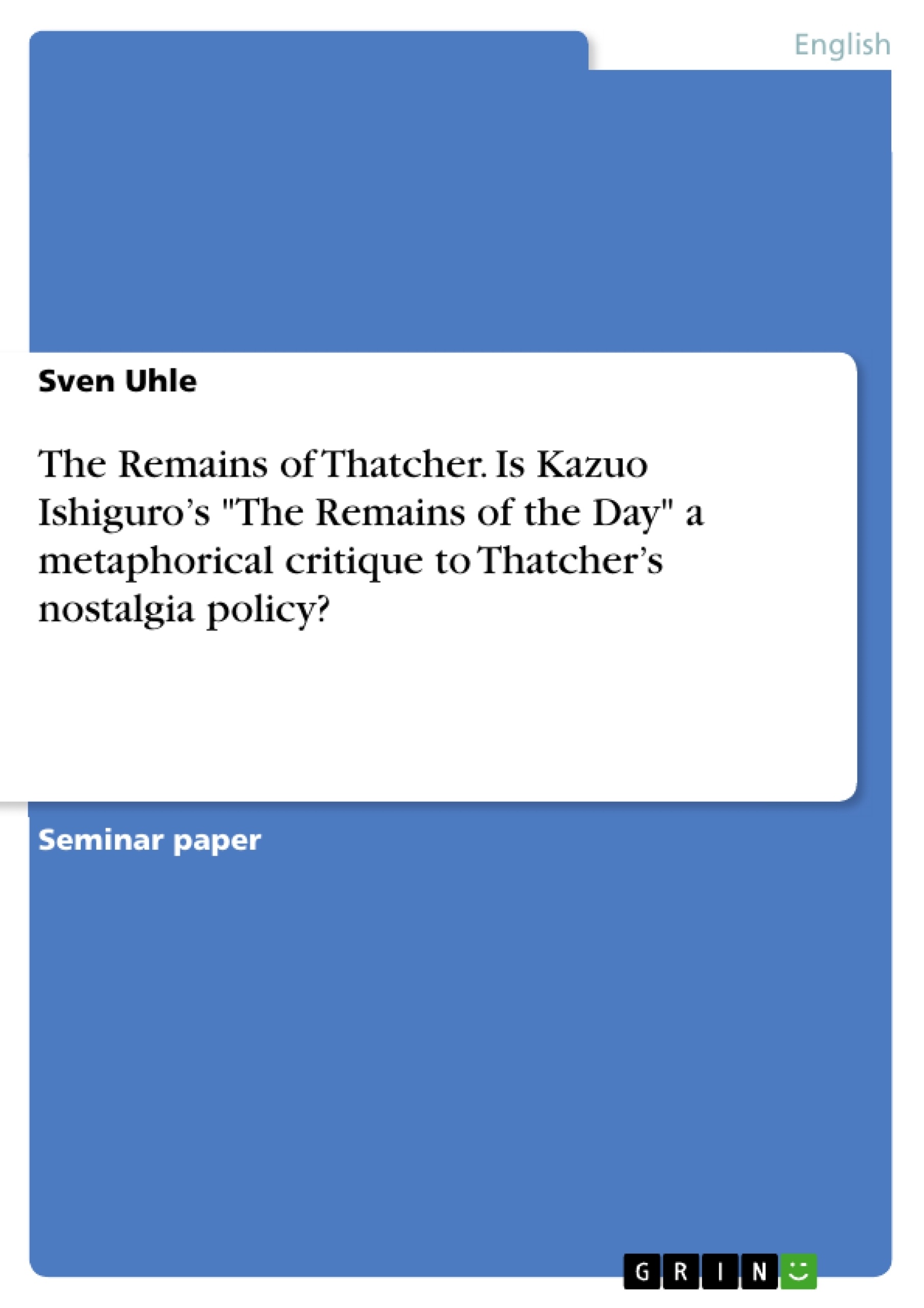This paper sets out to analyze Kazuo Ishiguro’s The Remains of the Day (1989) with a particular focus on the novel’s protagonist as a representation of typical English stereotypes. The following paper is divided into five chapters. After a brief introduction in chapter 1, an introductory overview of Kazuo Ishiguro’s novel follows in Chapter 2. Chapter 3 tries to define the term Englishness as a national identity. Chapter 4 comprises a close reading analysis of the two major motifs in The Remains of the Day. In the fifth chapter, the author draws a comparison between the decline of Darlington Hall with the decline of the British Empire. He tries to emphasize in how far Thatcher’s policy is offended by Ishiguro’s novel. Chapter 6 will present a conclusion on the findings from the topics covered in this paper and gives a prospect on further research questions
Margaret Thatcher’s reordering of the duties and responsibilities of the state, the privatization of state-owned industries, and the restrictions in the welfare policy were unique and caused a sensation in the European Community. In her political agenda, the term ‘British Identity’ was highlighted, especially in relation to her foreign policy campaigns, like the Falkland’s War or her concerns about the European Community.
In his novel The Remains of the Day, Kazuo Ishiguro establishes a set of typical English stereotypes. Those stereotypes cover a sense of nostalgia, which is, according to Su, “… essential in forming a national identity”. The nostalgia in the novel is established around the protagonist Stevens, who is obliged with the terms of dignity and Englishness. Margaret Thatcher’s call for a return to ‘Victorian values’ is dedicated to such a nostalgia. Her aim was to redefine a national idea of Englishness. This redefinition of the Englishness and the way nostalgia is used in creating an idealized national identity is what Ishiguro worries about. In The Remains of the Day, those values of the past are mirrored through Stevens and Darlington Hall in a degenerative condition, both Stevens’ journey and the estate can be taken as a metaphor of Ishiguro’s worries about Thatcher’s nostalgia policy. The question that therefore arises is “In how far does Kazuo Ishiguro’s novel The Remains of the Day function as a metaphorical critique to Thatcher’s nostalgia policy?”
Inhaltsverzeichnis (Table of Contents)
- Introduction
- Object of Investigation and Research Question
- Purpose and Structure
- Kazuo Ishiguro's The Remains of the Day- Overview
- Englishness a ‘National Identity'
- Motifs: Englishness and dignity
- How does Stevens implement an ‘image of Englishness'?
- Stevens' preoccupation with 'dignity'
- The Heritage in The Remains of the Day
- The decline of the nostalgic estate
- Ishiguro and Thatcher – The politics of decline
- Conclusion
Zielsetzung und Themenschwerpunkte (Objectives and Key Themes)
This paper examines Kazuo Ishiguro's novel The Remains of the Day (1989) to determine whether it serves as a metaphorical critique of Margaret Thatcher's nostalgic policies. The analysis focuses on the novel's protagonist, Stevens, as a representation of typical English stereotypes and the themes of Englishness, dignity, and nostalgia.
- The portrayal of Englishness as a national identity
- The role of dignity in shaping Stevens' actions and worldview
- The connection between nostalgia and the construction of national identity
- The decline of Darlington Hall as a metaphor for the decline of the British Empire
- The potential criticism of Thatcher's nostalgic politics in the novel
Zusammenfassung der Kapitel (Chapter Summaries)
- Introduction: Introduces the research question, "In how far does Kazuo Ishiguro's novel The Remains of the Day function as a metaphorical critique to Thatcher's nostalgia policy?" It also outlines the purpose and structure of the paper.
- Kazuo Ishiguro's The Remains of the Day- Overview: Provides an overview of the novel, focusing on the protagonist, Stevens, his journey, and the narrative structure.
- Englishness a ‘National Identity': Explores the concept of Englishness as a national identity, drawing on research by Pierre Nora, Christine Berberich, and Kathleen Starck, and relating these concepts to the novel.
- Motifs: Englishness and dignity: Examines two key motifs in The Remains of the Day – Englishness and dignity. The analysis focuses on Stevens' embodiment of these motifs.
- The Heritage in The Remains of the Day: Analyzes the decline of Darlington Hall as a representation of the decline of the British Empire, and explores the potential parallels between the novel and Thatcher's policies.
Schlüsselwörter (Keywords)
The main keywords and focus topics of the paper are Englishness, national identity, nostalgia, dignity, British Empire, Margaret Thatcher, and Kazuo Ishiguro's The Remains of the Day.
Frequently Asked Questions
Is "The Remains of the Day" a critique of Margaret Thatcher?
The paper argues that the novel functions as a metaphorical critique of Thatcher's "nostalgia policy" and her redefinition of British national identity.
What does the protagonist Stevens represent?
Stevens represents typical English stereotypes, particularly regarding a sense of duty, emotional restraint, and an idealized version of "Englishness."
How is "Englishness" defined in the novel?
Englishness is portrayed as a national identity built on nostalgia, dignity, and a specific set of traditional values that Ishiguro examines critically.
What is the significance of Darlington Hall's decline?
The decline of the estate serves as a metaphor for the decline of the British Empire and the degenerative condition of the values Thatcher sought to revive.
How does the novel mirror Thatcher's 'Victorian values'?
Thatcher's call for a return to Victorian values is reflected in Stevens' obsession with dignity and hierarchy, which the novel shows to be ultimately hollow or destructive.
What is Ishiguro's concern regarding nostalgia?
Ishiguro explores how nostalgia is used to create an idealized, but potentially dangerous or exclusionary, national identity.
- Arbeit zitieren
- Sven Uhle (Autor:in), 2016, The Remains of Thatcher. Is Kazuo Ishiguro’s "The Remains of the Day" a metaphorical critique to Thatcher’s nostalgia policy?, München, GRIN Verlag, https://www.grin.com/document/436529



